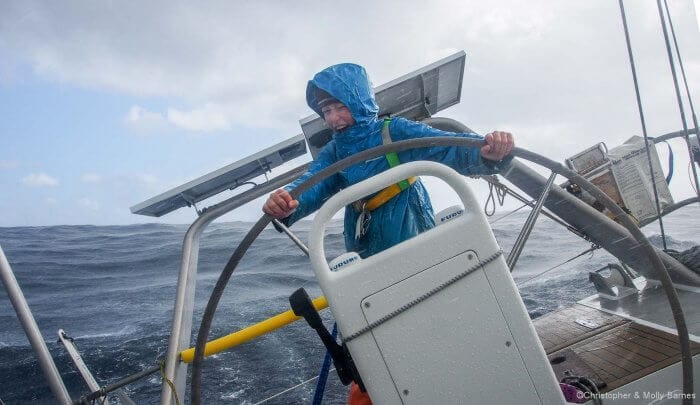
For the last three years I have lived on Sila, a Boréal 47, with my family.
My parents wrote a while ago about living with kids on a boat from a parent’s perspective. I am going to write from a kid’s perspective, with tips both for other kids and for parents.
As I am twelve years old, there are lots of small things that, put together, contribute largely to my overall happiness. This is a collection of ten tips that I have found make living on a boat even more enjoyable.
#1 School
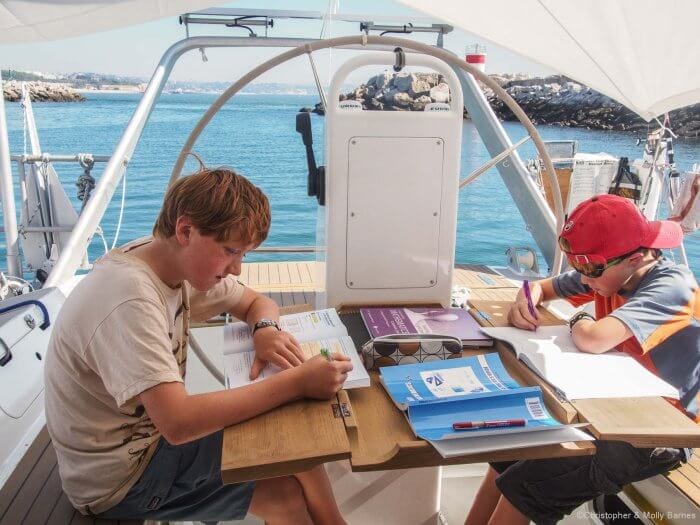
Having a flexible school schedule allows you to take advantage of an interesting place and its learning opportunities.
Each day of school consists of three to five short classes. Math, writing and reading are good examples, which happen almost every day. The nice thing about a whole bunch of short classes is the flexibility. When there is a really cool thing to do onshore, we postpone or even skip a piece of school, and it’s no big deal. When there is nothing special to do, I get ahead of school. I think flexibility is key.
On passage you should do no school, then lots of it. For the first few days of an ocean journey, my brother and I are prone to being seasick. For the first few days, do no school until everyone has their sea legs. Passage sometimes is slow and repetitive so, after you have sea legs, do lots of school while there is not much else to do. Later, when there are interesting things on shore, the school work is already done.
#2 Entertainment
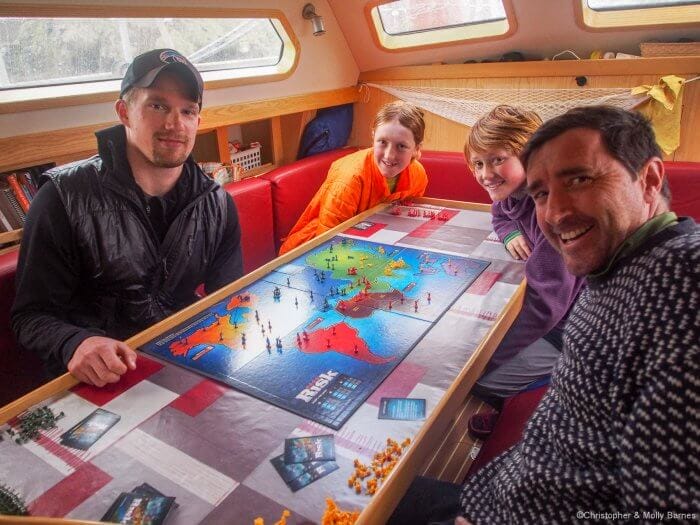
Bring only your favourite and multi-use toys and games.
My brother and I have a small cabinet of things that entertain us for hours. A deck of cards is a great example. From Go Fish to Hearts, Solitaire to magic tricks, cards have a lot of uses for such a small box. Also, portable versions of games are good because of the minimal space they take up.
Having fewer toys and games than at home has inspired us to use our imagination more and to engage with our surroundings. While computer games are fun, I think I have benefited more from using my imagination and socializing with my family.
#3 Snacks
I think that being hungry evolves into being grumpy, so I suggest having easy access to snacks at any time of day.
We have the Snack Cabinet, a cabinet full of granola bars, peanuts, raisins, and crackers. The thing that makes it special is the fact that at any time, and without asking, I can eat what I want without disrupting my mother’s careful food filing system. This way I am rarely hungry and always happy.
#4 Books
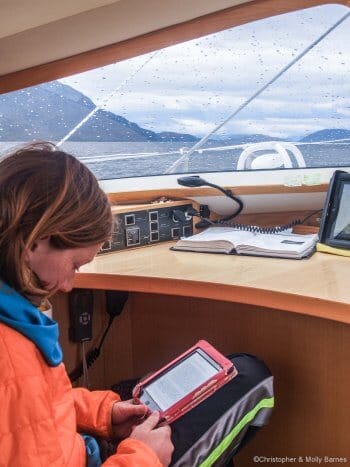
You should have an e-Reader.
My family, and my brother in particular, likes to read a lot. On a boat there is limited room for books. Instead of trying to make room for all our books, we have four Kindles. They can hold thousands of stories and novels, all in the size of one. I love my Kindle and it contributes to making reading fun and easy.
#5 Downtime
You should have a system for getting personal space.
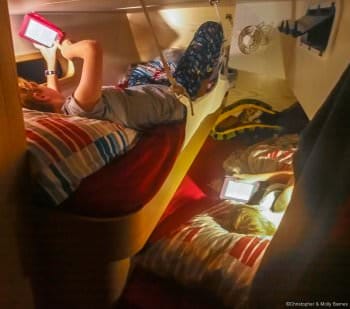
On a boat, time away from people is a prized commodity. Getting enough of it can sometimes be hard because a boat is so small and confined. Rather than physically getting away from each other, I suggest mentally isolating yourself. My brother will read and I will put on headphones so, even though we are a few feet from each other, we feel separate. Living within a confined space can be difficult and life greatly improves when everyone can be by themselves for a while.
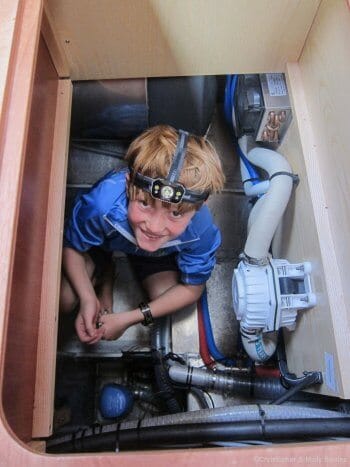
#6 Keep It Fun
I like being crew and having the responsibility of helping make life on the boat work. Now I do lots of things, including washing the dishes every other night, making dinner one night each week, and standing four hours of watch each day on passage.
Three years ago I did much less in terms of sailing, anchoring and helping out. Back then so much work would have been hard and no fun. My parents eased the responsibility on us, for which I am grateful.
#7 Share Responsibility
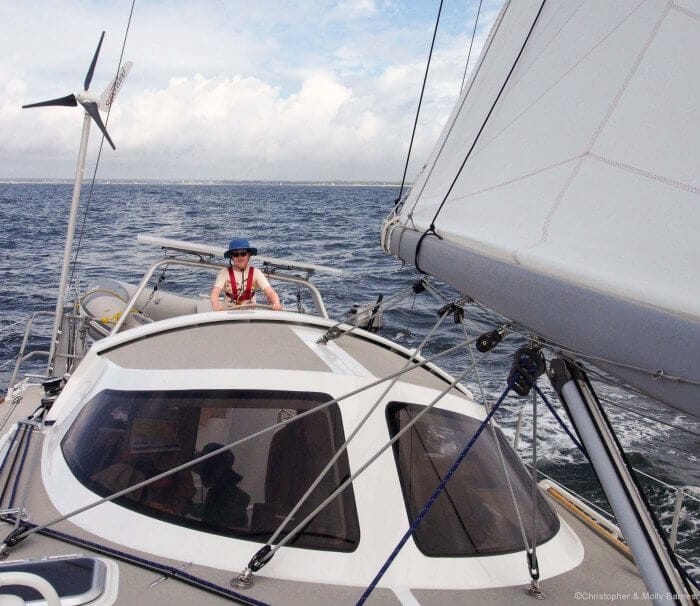
Include your child in the watch schedule on passage.
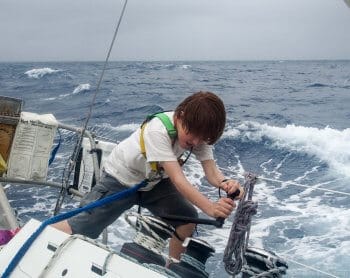
Part of the responsibility I like includes taking watch. Each passage I have taken more watch, starting at none, climbing up to five hours. At first I did an hour of watch with a parent right there coaching me. Now, in settled conditions I can do several two or three hour shifts with my parents down below, napping. Not only does it give me a good fun learning experience, but it gives our parents more time to sleep.
#8 Celebrations and Surprises
Passages can sometimes be long and boring, so I suggest having celebrations and surprises to break up the passage.
Our family has passage prizes. The person in charge of passage prizes chooses monumental or special times to hand out goodies and treats. Some examples include crossing the halfway mark, passing a particular latitude, or completing a certain number of miles.
When our odometer reached 30,000 miles, my brother and I surprised the crew with a cold bottle of Fanta Limón, a treat on Sila since we do not often have soda. Also, my Mom and I (the two who love music) play songs and have dance parties to mark events.
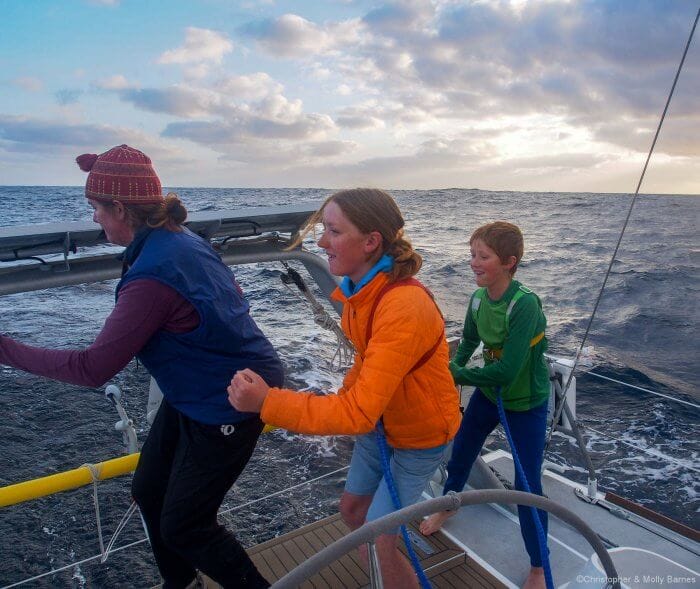
The parties and treats give us something to look forward to, and break up a long slow passage.
#9 Crew Meetings
You should have a time when everyone can express their feelings.
On passage it is hard to find a time when everyone is present and awake. During the time that everyone is present, which happens to be right after dinner for us, we all gather for what we call Crew Meeting. In Crew Meeting we all voice how our day went, what would be helpful to change, and logistics concerning the boat. This gives us time to vent our feelings and help each other make a system that works for all of us.
I suggest having a time for everyone to vent their feelings where everyone can hear them.
# 10 Go To Cool Places
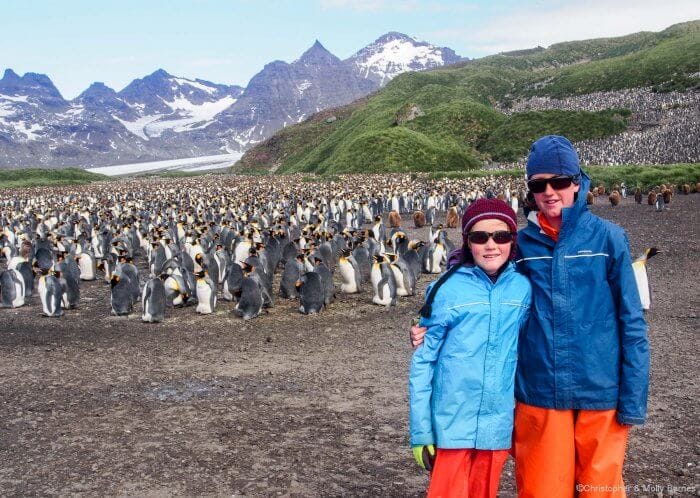
Maybe this goes without saying, but I think you should just go to cool places. It may seem obvious but it largely contributed to my family having the time of our lives. We toughed it out through the rough parts and ended up in amazing places (including South Georgia).
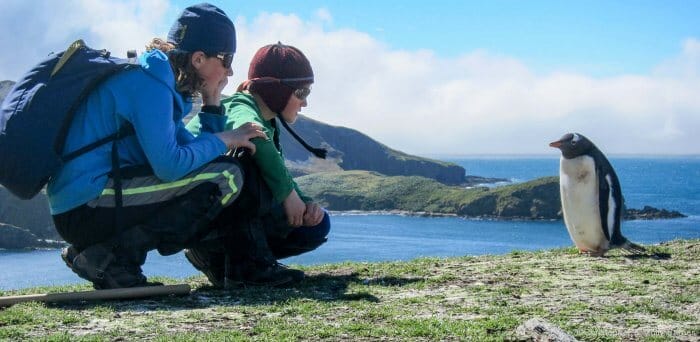
These ten tips all contributed to making me and my family happy. I hope they help you make life on a boat easier and filled with great experiences.
Further Reading
- Christopher and Molly’s post Attainably Adventurous Children
Comments
I’d love to hear from any other kids about how you make living on a boat easier and more fun. Please leave a comment.
[Note that AAC memberships include all family members living in the same house, so kids, log on as your parents, but use your own name and email address (if you have one) when you leave a comment , and have at it. You can also get your own Avatar by uploading a picture here.]


Hi Jack
what a fantastic appraisal of what makes for a good cruise – all of the family.
This should be required reading for ALL families who want to go cruising, let alone those families who are looking to undertake the kind of extraordinary voyage that you all took part in.
Terrific stuff!
Best wishes
Colin
Colin,
Thanks for the comment and for all your help editing so I could make this post work.
Cheers,
Jack
Hi Jack
thanks, but my contribution was minimal and largely limited to encouragement. What matters is the content and (as always) content is king!
Best wishes
Colin
Very well done. I’m showing this to my 14 year old son. Thank you for posting it.
You’re welcome. Thanks for reading my article. I hope your son likes it and finds it helpful.
All ten tips are great advice for anyone of any age.
Glad to know I am not the only one who gets grumpy when hungry.
Thanks for the comment Michael. I agree- food lightens to mood a lot. I’m glad I can relate to someone else. I hope you found the article helpful.
All the best,
Jack
Hi Jack,
Just a super list, not only in content but in attitude. Thanks for sharing.
You are likely a little old, but I have a suggestion for those families with smaller children. When I had 3 children under the age of 7 on a 28-foot boat for periods of time, one of the favorites was a very simple, inexpensive inflatable “swimming pool” of about 4-foot diameter. It fit right on the foredeck, filled with a few buckets of salt water, and clean up was easy. The kids had a grand time for hours and we were the only “yacht” we knew with a swimming pool.
Keep up the good work, Dick Stevenson, s/v Alchemy
Hi Dick,
The swimming pool idea is a great one. My family and I saw another on-board swimmining pool in Panama. The people on board that boat seemed to be enjoying themselves. I can imagine the fun your kids had.
Cheers,
Jack
Good on you Jack – great tips. Our family are all grown up but still come away with us individually on short cruises and ski trips – a family that plays together stays together huh? Some questions for you:
What are you most proud of achieving in your sailing / adventuring to date? How did YOU achieve it? What is the best place you have been to? And finally why that place Jack?
best regards
Rob
Hi Rob,
Before sailing, I lived in Colorado. I loved skiing. You’re my kind of person: someone who likes cruising and skiing with his family. As for your questions, I am most proud of being able to stand four hours of watch on my own. My parents taught me how to sail more and more until I could be trusted to do it. My favorite place is an island near Antarctica called South Georgia. It has towering peaks with glaciers, penguins, seals and whaling history. It is isolated and has a rugged beauty. I hope I answered you questions.
Best Regards,
Jack
I showed my son your article. He was impressed, particularly with the watch-standing and South Georgia. My late father was there in the late 1940s when whaling was still thought to be a good idea. I’m sure you saw some of the wrecked whaling factories at Grytviken. He told me that whaling in some ways was worse than World War II. I’m sure hanging out with penguins must have been a highlight.
Hi Jack.
We are on a ski trip on an active volcano (Mt Ruapehu in NZ) as I write from our club’s ski lodge on the mountain. White-out conditions outside.
Cool answers Jack, in both meanings of the word. Being sole watch keeper the first time is a special feeling. I was 19 and a trainee officer before I got my first sole watch offshore, so you have a big lead on me! We were in the Pacific between the USA and Australia/NZ on a cargo ship, standing the 4-8 watch. But I was 15 when I first took command of our tiny family yacht and sailed solo across the Bristol Channel on a 3 day adventure. Coming back I hit thick fog, and after 5 hours sailing in “soup”, my DR was less than quarter mile out. In those days I had a compass, a lead line and a paper chart in a plastic bag to navigate by. Despite the smaller scale, that’s the one I recall most 40 years later. Thanks for sharing with us.
Rob
Hi Jack, I think all your tips , except for schooling apply to adults as well. Myself, I am very keen on the snack cabinet, a drawer on our boat. It is probably the most often used drawer in the whole boat! And now that I think about it I could replace your tip on schooling ( I am 52) by studying a new language. All the best for your return to land life
Cheers
Chris
Hi Chris,
I am also very keen on the snack cabinet. Thanks for commenting and I hope you learn your new language quickly.
Cheers,
Jack
Hi Jack, thank you for the very cool tips!
My son is 15 years old and he doesn’t like sailing. At all. I think he’d really get into it and enjoy it if he gave it a chance, but he refuses to go with me. Do you have any suggestions on how I could get him interested? Or should I just accept that he’s not into it like me and continue to go without him?
Also, I’d love to hear more about what you feel are the benefits you enjoy at sea compared to a life on land. And what things do you miss from being on land. Maybe another post? 😉
Best wishes,
Chuck
Hey Jack,
One of the most interesting articles I have read in a long time. My father bought our boat when I was three months old. All my summer holidays we were sailing, first in my home country the Netherlands, later we did longer journeys to Norway, Sweden, France, etc. This all accumulated into me and my father sailing for 9 months round the Atlantic when I was 18.
And now I am almost finished cruising with my girlfriend (and many friends), again to the Caribbean and back.
But one thing you start thinking about when you yourself get older is: what if we have kids? Can we still cruiseand how?
Thats why your article is so great to read: a First hand impression what it could be like for my own kid, of we haver have one.
Thanks jack; I wish you many More great adventures!
All the best,
Joris
Sorry for the typos, its my phones autocorrection…